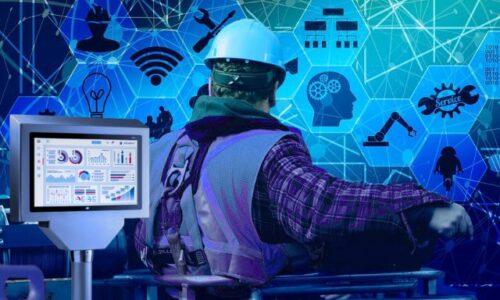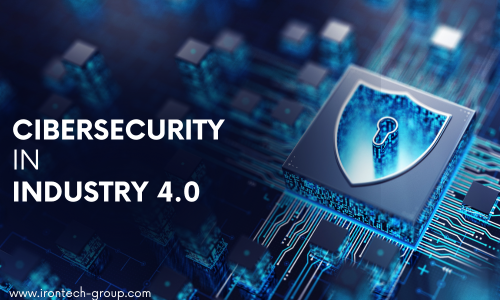In the field of industrial computing, there have been significant advances in recent years that have transformed the way organizations manage their processes and operations. The combination of digital transformation, automation and cybersecurity has opened up new opportunities to improve efficiency, productivity and security in industrial environments. In this article, we will explore current trends in industrial computing, focusing especially on Panel PCs and industrial monitors, and their role in the digitilization and automation of processes.
How industrial computing influences digital transformation
Digital transformation has revolutionized the way organizations approach the management of their industrial processes thanks to industrial automation. There has been a growing adoption of digital technologies, such as the Industrial Internet of Things (IIoT) and the cloud, to collect, visualize and analyze data in real time, enabling more informed decision-making and greater operational efficiency, thereby reducing errors and increasing productivity.
In this context, Panel PCs and Industrial Monitors play a fundamental role by providing intuitive and robust interfaces to interact with systems and data. Therefore, industrial computing is a key element for this culture of digitalization, as it helps to carry out these projects of continuous improvement of processes and security. This equipment is suitable for controlling both actions and maintenance of processes in production lines, as well as quality control and throughout the supply and logistics chain.
Control and management interface: Panel PCs
Panel PCs are devices that combine a touch screen with an industrial computer with high processing capacity. These systems allow operators to interact with control and monitoring systems in a more efficient and practical way. Panel PCs are highly customizable and can be adapted to the specific requirements of the industry and its applications, so they can control machines and components. This makes them the linchpin of industrial computing and the digital transformation of industry, as they become the backbone of all automation components.
Data visualization and control: Industrial Monitors
Industrial monitors play a crucial role in visualizing critical data in industrial environments. These devices are designed to withstand the most demanding conditions and provide a clear and accurate representation of relevant information. This visualization of critical data or status of the systems is essential for fast and safe decision making, since this facilitates the monitoring of processes, the detection and reaction to problems, emergencies or process changes and the implementation of improvements.
Industrial computing in automation
Automation has been one of the key drivers of efficiency and productivity in industrial computing. The combination of Panel PCs, industrial monitors and automation systems enables efficient execution of repetitive tasks, reduction of human error and optimization of processes. Automation also facilitates system integration and real-time data collection, enabling decision-making based on up-to-date and accurate information.
Automation offers numerous benefits in industrial environments. Some of the most important advantages are:
- Improved efficiency and productivity: Automating repetitive tasks and optimizing processes improves efficiency and productivity in the industry, reducing production times and minimizing errors.
- Improved safety: Automation allows the elimination of dangerous or risky tasks for operators, which improves safety in the work environment.
- Data-driven analysis and decision-making: Automation facilitates real-time data collection and analysis, enabling more informed and accurate decision-making.
Cybersecurity, a growing trend for Industrial Computing
As industrial computing advances, cybersecurity has become a crucial concern. Industrial systems and devices are increasingly connected, making them vulnerable to cyberattacks. The protection of industrial systems and data is essential to ensure continuity of operations and integrity of processes. In this sense, Panel PCs and industrial monitors play a fundamental role in implementing robust security measures.
Panel PCs and industrial monitors are designed to ensure the security of industrial data. Some of the key security features include:
- Encrypted connections: Panel PCs and industrial monitors use encryption protocols to ensure that communications between devices are secure and protected against unauthorized access.
- Authentication and authorization: These devices implement authentication and authorization mechanisms to ensure that only authorized users can access industrial systems and data.
- Security updates: Panel PC and industrial monitor manufacturers regularly provide security updates to address vulnerabilities and protect devices against the latest cyber threats.
Future trends in industrial computing:
In this article we have mentioned and explained the trends that are present today throughout the industry. But there is already and testing of new systems thanks to the availability of the most advanced technologies in industrial computing and little by little they will gain momentum. These future trends are:
- Artificial vision or industrial computer vision: through the use of industrial computers and advanced cameras it is possible to capture and understand images and execute tasks or commands. Such a system can also be used to process and analyze data for automated decision making.
- Artificial intelligence and machine learning: Together with automation, this technology can be the future of security and processes, since it a proactive approach, with the due improvement of decision making through perfect algorithms and data patterns. They can locate threats and hazards, reduce error margins, increase cybersecurity and sustainability.
- The Metaverse in the industry: something that is talked about a lot, which is said to be called the new industry 5.0 standard and can bring a lot of hope and opportunity to the industry with remote work, product improvements, process optimizations, greater safety for operators and plants and a social and sustainable increase for companies.
Undoubtedly, the trends in industrial computing that we have seen are real and are being applied throughout the industry, being already a key piece for the growth and continuous improvement of all sectors. But these new and futuristic trends that now seem far from the real world will be in a few years the key factors that will change the whole direction and meaning of the industry.



